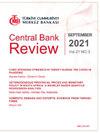Monetary policy spillovers between the US and African Central Banks: A time- and frequency-varying connectedness study
Abstract
This study investigates time and frequency connectedness between monetary policy in the US and 7 African countries to determine the extent to which US monetary policy influences policy conduct amongst African Central Banks. We use a time-varying parameter vector autoregressive (TVP-VAR) framework with frequencies to extract the spectral representation of the forecast error variance decompositions of the TVP-VAR and form 3 bands of frequency strata corresponding to long-run, medium-run and short-run. The results of the study are as follows: firstly, the static analysis shows that the US is the dominant transmitter of systemic shocks across all frequencies and the vulnerability of African countries as recipients of these shocks varies across frequency bands. Secondly, the dynamic analysis further reveals stronger short- and medium-run systemic connectedness during the periods of the Large Scale Asset Purchase programme and forward guidance policies whereas long-run connectedness is prominent during periods of US conventional monetary policy particularly in the COVID-19 era. The findings from the country-by-country dynamic spillover specifically show that countries which are more (less) responsive to US monetary policy shocks have lower (higher) inflation rates averages since the start of the pandemic. The findings suggest that African Central Banks can be benefit from higher coordination with the US Federal Reserve and we further propose that Central Banks worldwide in setting similar inflation targets.

 求助内容:
求助内容: 应助结果提醒方式:
应助结果提醒方式:


